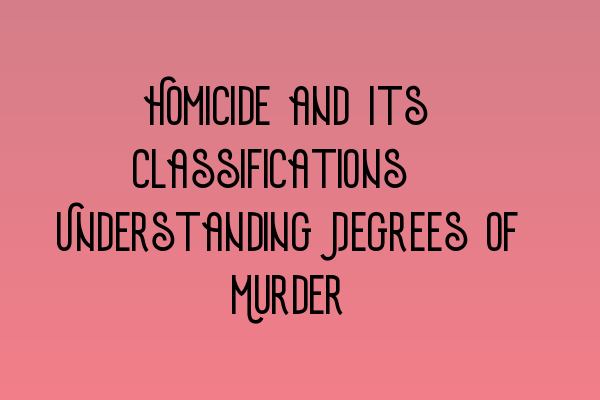Homicide and Its Classifications: Understanding Degrees of Murder
When it comes to criminal offenses, few are as significant as homicide. The taking of another person’s life is a serious matter that carries severe legal consequences. In the United Kingdom, homicide is classified into different degrees, each with its own set of criteria and penalties. Understanding these classifications is essential for both legal professionals and the general public. In this article, we will delve deeper into the degrees of murder, their definitions, and the implications they have on criminal law and practice.
First-Degree Murder
First-degree murder is the most serious form of homicide and is classified as a deliberate and premeditated act. It involves the intentional killing of another person with malice aforethought. Malice aforethought refers to the intention to cause death or serious harm to another person. First-degree murder carries the harshest penalties, including life imprisonment or even the death penalty in some jurisdictions.
If you are facing charges of first-degree murder, it is crucial to seek legal representation immediately. Legal Representation for Delaware LLCs in the UK: Expert Advice can provide valuable guidance and representation to protect your rights and ensure a fair trial.
Second-Degree Murder
Second-degree murder is similar to first-degree murder in that it involves the intentional killing of another person. However, the key difference is the absence of premeditation. Second-degree murder is often referred to as a crime of passion, as it occurs in the heat of the moment without prior planning. The penalties for second-degree murder are slightly less severe than first-degree murder, but they can still result in lengthy prison sentences.
Preparing for the Solicitors Qualifying Examination (SQE) requires comprehensive study materials. Check out SQE Exam Prep: Essential Study Materials for Aspiring Solicitors for expert advice and resources to help you succeed in your legal career.
Voluntary Manslaughter
Voluntary manslaughter is another form of unlawful killing, but it is distinguished from murder by the presence of mitigating factors. It occurs when the offender kills another person in the heat of the moment as a result of provocation or diminished responsibility. Provocation refers to a situation in which a reasonable person would have lost control due to sudden and extreme provocation. Diminished responsibility, on the other hand, involves a partial defense that reduces the culpability of the offender due to mental impairment or abnormality.
Building strong cases in UK courts often relies on expert testimonies. Learn more about Expert Testimonies in UK Courts: Building Strong Cases and how these testimonies can contribute to your defense or prosecution strategy.
Involuntary Manslaughter
Involuntary manslaughter occurs when a person unintentionally causes the death of another person due to negligence or a reckless act. Unlike voluntary manslaughter, there is no intent to cause harm or kill. However, the individual’s reckless or negligent behavior leads to someone’s demise. Involuntary manslaughter does not carry the same level of intent and malice as murder or voluntary manslaughter, but it is still a serious offense with significant legal consequences.
Understanding the Solicitors Qualifying Examination (SQE) format is essential for aspiring solicitors. Demystifying the Solicitors Qualifying Examination Format can provide you with valuable insights and strategies to excel in this important exam.
Conclusion
Understanding the different degrees of murder and their classifications is crucial for anyone involved in criminal law and practice. Whether you are a legal professional, an aspiring solicitor, or simply interested in the intricacies of the law, comprehending the implications and penalties associated with homicide can provide valuable insights.
For international lawyers preparing for the SQE exam, SQE Exam for International Lawyers: Challenges and Success Strategies offers guidance and strategies tailored to your unique circumstances.
If you find yourself involved in a homicide case, seeking the advice and assistance of experienced legal professionals is crucial. At SQE Criminal Law & Practice Law UK, we have a team of solicitors who specialize in criminal defense and can provide expert representation to protect your rights and ensure a fair trial.
